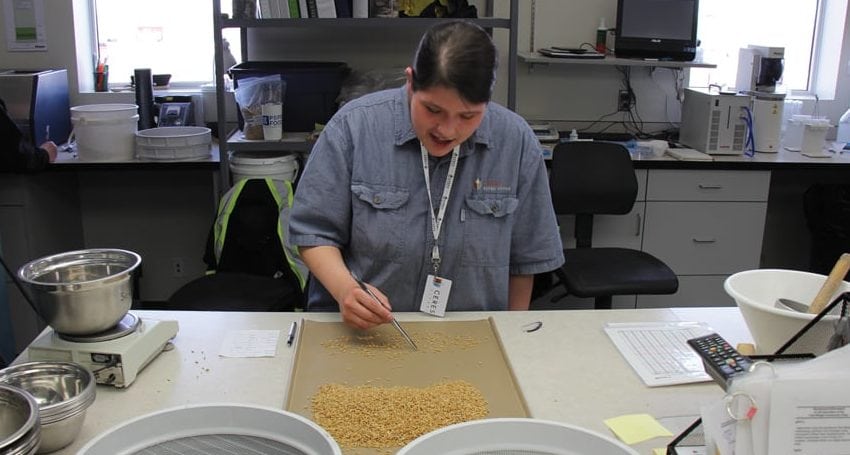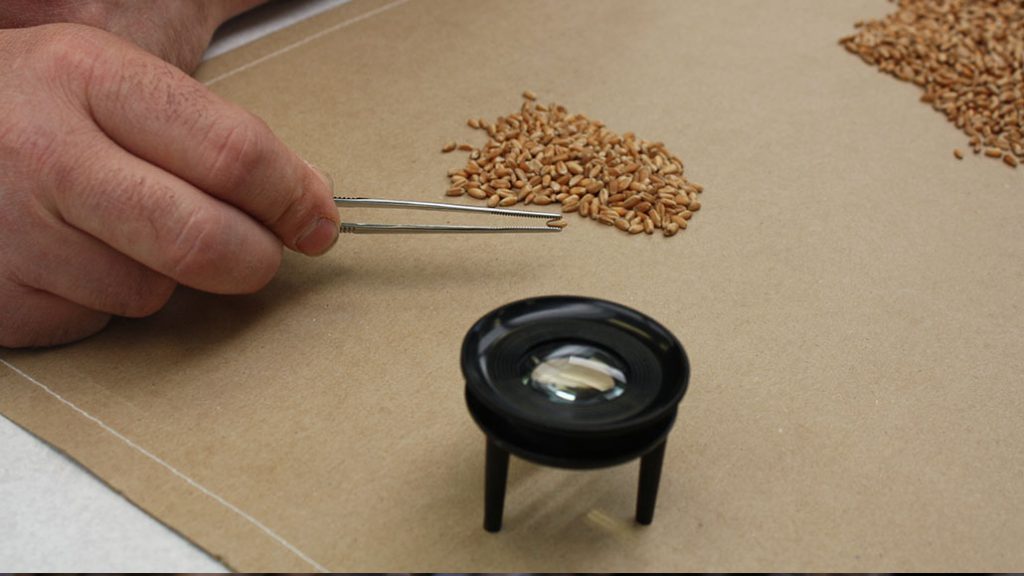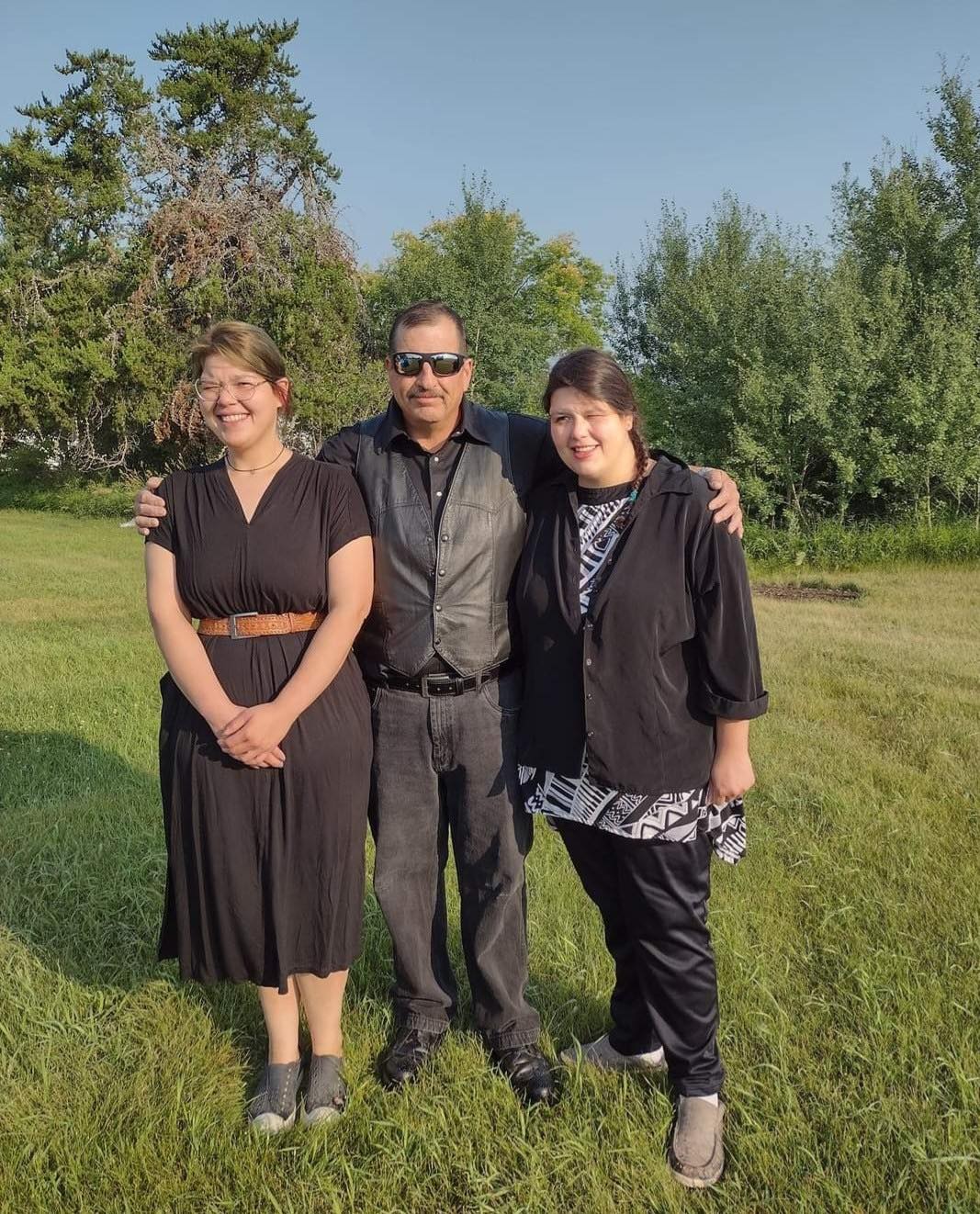Looking for more Indigenous news? Find our stories here.

Steve Flett spent 16 years as a grain inspector for the Canadian Grain Commission, and decades after that working for private companies. His daughter Lyndsie grew up around grain, spending quiet days at the office with her dad; he’d show her how to check for things like frost and fungus.
When Lyndsie turned 17, he brought her on as an assistant grain inspector. Now, over 15 years later, the duo are some of Canada’s few Indigenous grain inspectors.
As grain inspectors, Steve and Lyndsie have both spent a lot of time looking at grain.
The days can vary. At the Canadian Grain Commission, Steve would grade 30 to 40 samples a day but at an elevator, he’d grade anywhere from 100 to 150 samples a day during harvest.
“It’s pretty intense. A farmer will bring a bag sample and ask if you can grade the bin,” Steve said. “So then you grade it, look at moisture and everything and then tell the grain buyer more or less how they should buy it — is it a one, two or three.”
The work also involves running samples through a series of machines.
“In wheat, there’s 35 factors you have to look for and every province has their own problems with grain,” Steve said. “In Manitoba it’s fusarium and in Saskatchewan it’s usually sprouted.”
“And every year the grain looks a little different depending on weather,” Lyndsie adds. “So once you’ve seen so many different occurrences because of weather you have an easier time grading.”

While it’s an exciting industry to be a part of for the Fletts, it wasn’t always the most welcoming.
“I was called the token Indian because they needed Indigenous people to work for the government,” Steve said. “During my time at the Grain Commission when I would go into every elevator in Manitoba, every elevator in Saskatchewan, I didn’t see any other Indigenous person at any other elevator.”
Steve is Ojibway and Lyndsie is Cree-Ojibway.
“For a while I learned to just be quiet and I let them blab it out,” Steve said. “But after so many years of turning the other cheek, I couldn’t put up with (the racist remarks) anymore.”
“I don’t think I’ve seen another Indigenous person on the job other than my dad and myself,” Lyndsie adds.
And growing up, it was inspiring for her to see her dad as a trailblazer in the industry, but unfortunately, like her father, Lyndsie has experienced her fair share of racist comments and microaggressions.
“Some of the people I work with in the elevator don’t think too highly of my background and they make it known and they question my ability despite me being in this industry for years,” she said.
Despite it all, the pair love what they do. Steve got involved in the industry in Churchill, Man., during a time when the work was “inspiring.”
“Grain inspectors would come up there from all across Canada, from Vancouver to Montreal, Winnipeg and Calgary,” he said. “I was trained by the best in Canada up in Churchill.
“The work was exciting, we were unloading trains from all over Saskatchewan, Manitoba and Alberta and we were grading each car as they got unloaded.”
Originally from Winnipegosis, Man., Steve now lives in Wapella, Sask. with his wife Doris. The pair have moved around a lot for work, pausing for 12 years in Brandon, Man., to raise their daughters Lyndsie and Alixandra.
While both daughters have tried grain inspecting — with Doris as their biggest supporter — Lyndsie’s stuck with it and Steve said she’s also got a knack for it.
“She’s so artistic, she did a lot of drawing, she knew the colours, sizes and shapes and picked it up so good,” Steve said.
Now, taking a step back from grading grain, Lyndsie’s taking over the family legacy in a way — with a modern twist.
She’s begun working with tech group Super GeoAI to build an app that can help grade grain.
She’s currently working on assessing frost and heat stress damage, which she said can be one of the more difficult factors to assess because it’s done solely on visual appearance.
“The Canadian Grain Commission’s guide has pictures so we can use those to compare an image and then we look at the severity of damage,” she said. “I label each image based on the severity of damage, then we put it in the computer to teach the AI what different levels of damage look like.
“It’s been challenging, but it could be groundbreaking. It’s really exciting to be a part of.”








Comments